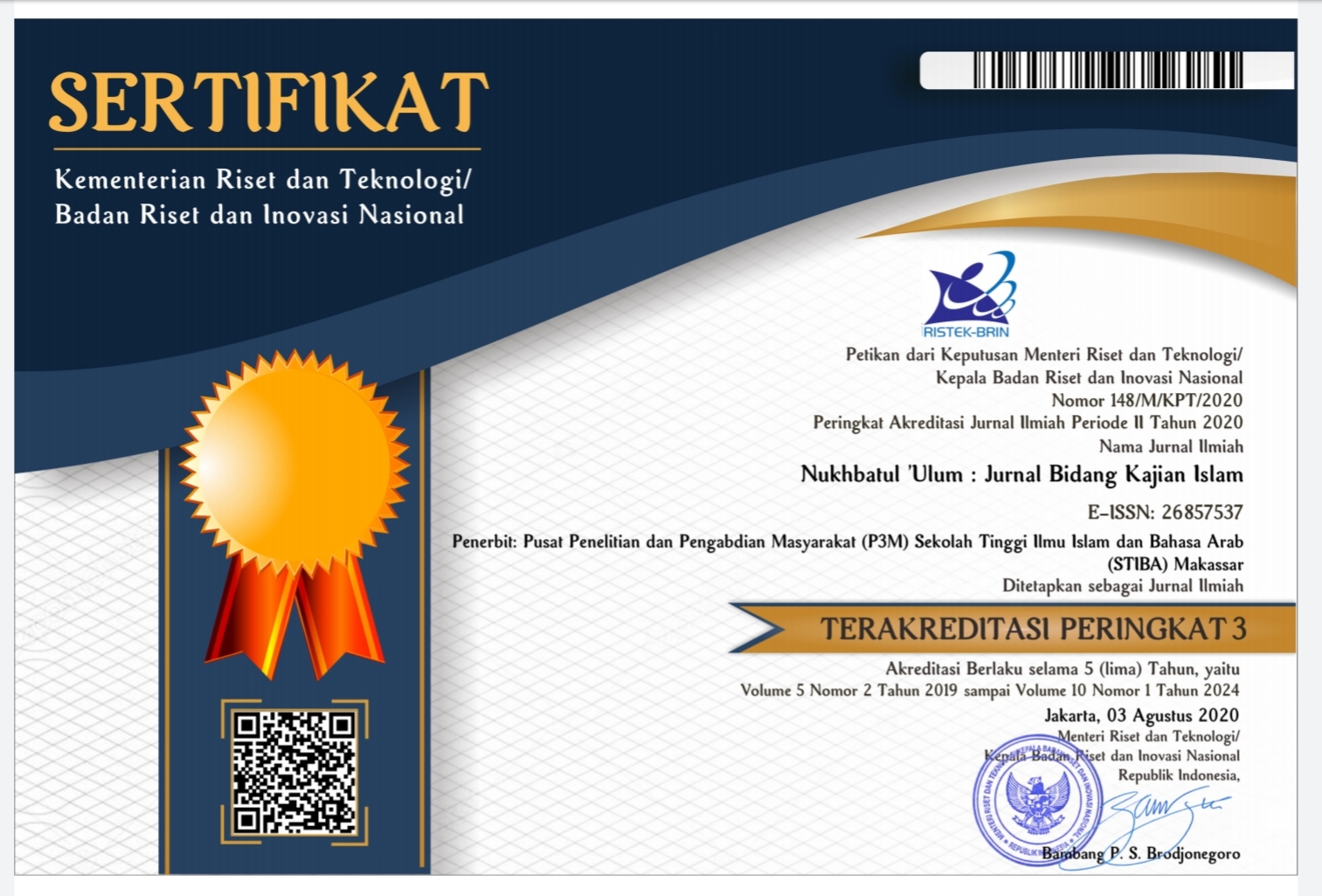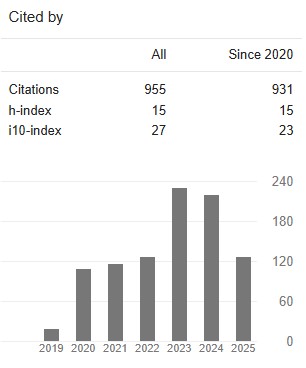Konsep Dilālah Fi'li al-Nabi dan Implikasinya Perspektif Fikih Ikhtilaf
The Concept of Dilālah Fiʻli al-Nabī and Its Implications in the Perspective of Fiqh Ikhtilāf
DOI:
https://doi.org/10.36701/nukhbah.v7i2.353Keywords:
dilālah, the actions of the prophet, ikhtilaf, qarīnah, taʼassīAbstract
This study aim to investigate the concept of dilālah fi'li al-Nabi in terms of interpreting the sunnah from the prophet. This study also aim to know the implication of dilālah fi'li al-Nabi of the perspective of fiqh ikhtilaf. The methodological approach of the study was qualitative literature review using philosophical normative approach and the rules of ushul fiqh approach. The results of this study indicate that: (1) The law of Istinbāṭ sunnah fiʻliyah has been considered to be different from sunnah qauliyah, particularly in an attempt to understand the dilālah. If the sunnah qauliyah is merely interpreted based just only by its language, the fi'liyah sunnah is interpreted based on the essence of prophets’ actions also. Therefore, it is necessary to have a deep understanding of determining the law of the Prophet's actions. The Prophet's position as a qudwah and a human being that Allah has given distinction to him made the application of the law become different to his followers. So that it has to be taken into consideration before deciding any laws related to the prophet’s hadiths. (2) Ikhtilaf uṣūliyīn on dilālah fi'l al-Nabī has implications on various fiqh problems which postulate the actions of the Prophet. Ikhtilaf happens in an attempt to understand fi’l al-Nabī al-mujarrad because there are no supporting argument or the qarīnah, the explanatory instructions which is useful as a lawmaker. Some uṣūliyīn think that taʼassī in terms of the actions done by Nabi Muhammads’ followers will be rewarded by Allah though the actions are not related to any worship. Therefore, the spirit of taʼassī to sunna Nabi must be follewed by a proper understanding and a proper application, because a contradictive application of maqāṣid syarīʻah can happen if it is partially understood and jumūd. In contrast, the other groups that are against this spirit must beware of falling into excessive attitudes that can ruin the good relation between muslims, and must beware of falling into deviations.
Downloads
References
Aba, Syukri. “Istinbath Nushus Al-Sunnah Melalui Pendekatan Tekstual Dan Kontekstual.” At-Tafkir 10, no. 2 (2017): 19–31. https://journal.iainlangsa.ac.id/index.php/at/article/view/302.
Al-Āmidī, Saifuddin. Al-Iḥkām Fī Uṣūl Al-Aḥkām. Juz 1. Riyadh: Dar al-Ṣumayʻī, 2003.
Al-Anṣāri, Ahmad bin Muhammad Umar. Āṡār Ikhtilāf al-Fuqahāʼ fī al-Syarīʻah. Riyadh: Maktabah Rusyd, 1996.
Arif, Al-Syarif Hatim. Ikhtilaf al-Muftīn wa al-Mawqif al-Maṭlūb Tijāhahu min Umūm al-Muslimin. Riyadh: Dar al- Ṣumayʻī, 2008.
Al-Asyqar, Muhammad Sulaiman. Af’āl Al-Rasūl Wa Dilālatuhā ’alā Al-Aḥkām Al-Syar’iyah. Juz 1. Beirut: Muassasah al-Risalah, 2003.
ʻAwwāmah, Muhammad. Ḥujjiyah Afʻāl Rasūlillah Uṣūliyyan Wa Ḥadīṡiyyan. Jeddah: Dar al-Minhaj, 2013.
Al-Bashri, Muhammad bin Ali al-Ṭayyib Abu al-Husain. Al-Muʻtamad Fi Uṣūl Fiqh. Juz 1. Beirut: Dar al-Kutub al-Ilmiyah, 1403H.
Al-Bayḍāwī. Anwār al-Tanzīl wa Asrār al-Taʼwīl. Juz 2. Beirut: Dar Ihya Turats, 1418H.
Al-Dahab, Asyraf Ṭāha Abu. Al-Muʻjam Al-Islāmī. Mesir: Dar al-Syurūq, 2002.
Al-Gazali, Abu Hamid. Al-Mustaṣfa Min ’Ilm Al-Uṣūl. Juz 2. Beirut: Muassasah al-Risalah, 2010.
Al-Gazālī, Abu Hamid. Al-Mankhūl Min Taʻlīqāt Al-Uṣūl. Beirut: Dar al-Fikr al-Muʻāṣir, 1998.
Al-Gazzi, Muhammad Sidqi Āl-Burnu. Mausūʻah Al-Qawāʻid Al-Fiqhiyah. Juz 3. Beirut: Muassasah al-Risalah, 2003.
Hanbal, Ahmad bin Muhammad bin. Musnad Imām Ahmad Bin Hanbal. Juz 36. Beirut: Muassasah al-Risalah, 2001.
Ikhsan, Muhammad "Membedah Faktor-faktor Penyebab Terjadinya Ikhtilaf di Kalangan Ulama". Nukhbatul ’Ulum: Jurnal Bidang Kajian Islam 2. No. 1 (2016): h. 140-158.
Al-Juwaini, Abu al-Maʻāli Abdul Malik. Al-Burhān Fī Uṣūl Al-Fiqh. Juz 1. Kairo: Dar al-Anshar, 2002.
Al-Jīzānī, Muhammad bin Husain bin Hasan Al. Maʻālim Uṣūl Al-Fiqh ʻInda Ahli Al-Sunnah Wa Al-Jamāʻah. Dammam: Dar Ibnu al-Jauzi, 1996.
Al-Kalwadzani, Abu al-Khattab. Al-Tamhīd Fī Uṣūl Al-Fiqh. Juz 2. Makkah: Jāmiah Umm al-Qurā, 1985.
Kementrian Wakaf dan Urusan Agama Kuwait. Al-Mausūʻah Al-Fiqhiyah Al-Kuwaitiyah. Juz 6. Kuwait: Dar al-Salasil, 1986.
Al-Khafif, Ali. Asbāb Ikhtilāf al-Fuqahāʼ. Mesir: Dar al-Fikr al-ʻArabi, 1996.
Al-Khallaf, Abdul Wahhab. ʻIlmu Uṣūl al-Fiqh. Cet: 20; Kairo: Dar al-Qalam, 1986.
Kiskis, Faḍlullah, and Abu al-Hasan Hisyām Al-Mahjūbī. Al-Muyassar Fī ʻIlm Uṣūl Al-Fiqh. Marākesh: Dar Walili, 2012.
Al-Maqdisi, Ibnu Qudamah. Al-Mugni. Juz 5. Riyadh: Dar ʻĀlam al-Kutub, 1997.
Mustaqim, Rizki. “Af’al Rasul Dan Implikasinya Terhadap Hukum Fikih.” Jurnal Peradaban Islam 1, no. 2 (2019): 278–299. https://doi.org/https://doi.org/10.22373/tadabbur.v1i2.13.
Naisabūrī, Muslim bin al-Hajjāj al-Qusyairī. Ṣaḥīḥ Muslim. Juz 1. Riyadh: Dar Ṭaibah, 2006.
Nasrullah, Sanip, and Reza Pahlevi Dalimunthe. “Segmentasi Term Sunnah Di Indonesia.” Journal Of Qur’an and Hadis Studies 2, no. 2 (2019): 54-70. https://doi.org/https://doi.org/10.30631/atb.v2i2.3.
Al-Namlah, Abdul Karim. al-Muhażżab fī ʻIlm Uṣūl al-Fiqh al-Muqāran. Juz 2. Riyadh: Maktabah al-Rusyd, 1999.
Al-Qurtubi, Muhammad bin Ahmad bin Muhammad Ibnu Rusyd. Bidāyah Al-Mujtahid Wa Nihāyah Al-Muqtaṣid. Beirut: Dar Ibnu Hazm, 1995.
Al-Syafi’i, Muhammad bin Idris. Jimā’ Al-ʻIlm. Kairo: Dar al-Atsar, 2002.
Al-Syairāzī, Abu Ishaq Ibrahim. Al-Lumaʻ Fī Uṣūl Al-Fiqh. Juz 1. Beirut: Dar al-Kutub al-Ilmiyah, 1995.
Syuraitih, Mahmud Ṣaleh. Al-Muhaqqiq Min ʻIlmi Al-Uṣūl Fīmā Yataʻallaq Bi Afʻāl Al-Rasūl Li Al-Ḥāfiẓ Abu Syāmah Al-Maqdisī. Madinah Munawwarah: Jamiah Islamiyah, 1432H.
Al-Sulmī, ʻIyaḍ Nāmī. Uṣūl al-Fiqh allażī lā Yasaʻ al-Faqīh Jahlah (t.d).
Al-Tirmiżī, Muhammad bin ’Isa. Al-Syamāil Al-Muḥammadiyah Wa Al-Khaṣāiṣ Al-Muṣtafawiyah. Beirut: Dar al-Kutub al-Ilmiyah, 2006.
Al-Turki, Abdullah bin Abdul Muhsin. Asbāb Ikhtilāf al-Fuqahāʼ. Beirut: Muassasah al-Risalah, 2021.


















